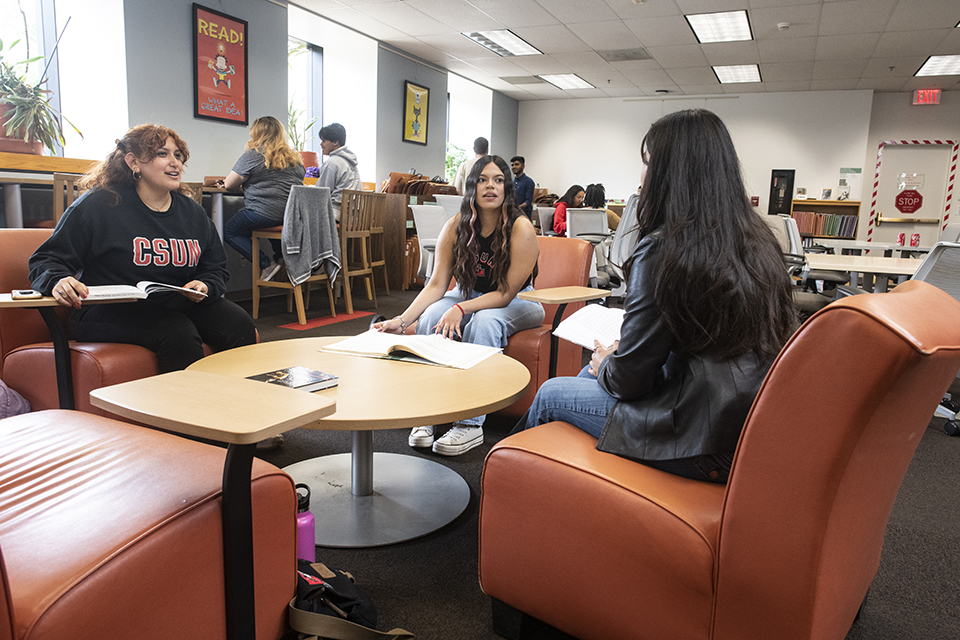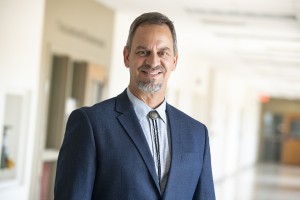Humanities Provide Valuable Skills to Keep Society from Crumbling, CSUN Dean

Students meeting in the Music & Media/Teacher Curriculum Center area of the University Library. Jeffrey Reeder, CSUN’s dean of the College of Humanities, argues that an education based in humanities or liberal arts provides valuable tools that keep society from crumbling. Photo by Lee Choo.
While politicians and even some colleges ponder the value of a liberal arts-based education, Jeffery Reeder, dean of California State University, Northridge’s College of Humanities, has no doubt that the lessons taught in those classes lay the foundation for society, and provide graduates with the tools for success.
“At the core of humanities disciplines—all of them—is asking questions about who we are as people, how we work together in groups and part of society and how we negotiate differences—whether it’s differences in goals, differences in ideologies, differences in our pasts or how we view our past,” Reeder said. “At the core of humanities are these questions: Why are we here? How did we get here? Where do we want to go, and how do we get there?

Jeffery Reeder
“At the same time, part of the questioning process is critical thinking, critical examination and critical analysis,” he said. “As we are beginning to see—and this has happened throughout human history—when people don’t know how to ask questions, or don’t feel they have the permission, the right, to ask questions, society crumbles. In extreme cases, society collapses. We have to ask these questions, and we must be able to critically ask these questions.”
Reeder said that regardless of the major—whether English, philosophy or ethnic studies—the core of the subject is critical thinking.
“We have to understand and think critically about where we have been, who we are and come to terms with where we are now,” he said, adding that the ability to think critically “is more important now than ever.”
He pointed to a discussion at a recent meeting of CSUN’s religious studies department.
“Among the topics to come up was the general understanding that the Los Angeles area is probably the most religiously diverse place in the world, probably the most religiously diverse city possibly in human history.” he said. “Nobody thinks of Los Angeles as a religious city, even though its name translates to ‘City of Angels.’ But when you think about it, and look critically at its history, you realize that the diversity of the population and the fact that acceptance and tolerance are just part of the ethos of Southern California, it makes sense.”
Reeder said there is a false dichotomy that a liberal arts- or humanities-based education does not give students the tools for success. Hence, he said, the pressure many politicians put on colleges to steer students away from majoring in English and into fields like engineering or business.
“That’s kind of been the national dialogue for maybe the last two or three decades—either higher education should be very, very practical or it should be very, very theoretical and abstract,” he said. “If a child of a privileged background goes to an exclusive liberal arts college on the East Coast, they are probably going to find the approach at that college is that the humanities are valuable. Don’t question whether you’ll get a job. Don’t question what the relevance is for your resume.”
That’s the core of human history and the core of human understanding, Reeder said.
“On the other extreme, people say we have unfilled jobs in the tech sector. We have unfilled jobs in the public sector. We have unfilled jobs… the list goes on,” he said. “For those people, the argument is that higher education should prepare people to go to work directly after they graduate. Say you graduate May 21, you take a couple days off, and then you start work. I strongly argue that’s a false dichotomy.”
He said research has shown that, yes, that upon graduation, those college graduates who earned degrees in the liberal arts or humanities earn less than their counterparts with more “practical” degrees.
“But large-scale national data shows that 12 to 20 years from graduation, the earnings of humanities graduates have caught up to their peers with other degrees and, in many cases, surpassed them,” Reeder said.
He was at a local chamber of commerce event a few weeks ago and met an alumnus who was a graduate of CSUN’s College of Humanities, and now works at a high-level job in finance.
“He said his degree didn’t prepare him for his first job, but it prepared him for his future in the world,” Reeder said. “He said it prepared him to think critically, to work comfortably with others who were different from himself, analyze data, to take risks and think outside the box. And those were the skills he needed to rise through the ranks and succeed at his company.”
Reeder circled back to the original question about the value of a humanities degree.
“What we’re doing here in public higher education, more than anything else, is about the long-term health of our society—it’s about whether or not we’re still going to be a functioning society 50 to 100 years from now,” he said. “We really, fundamentally depend on public higher education to be able to answer that question positively. And the ones who are going to make that happen are those whose education was based in the humanities.”

 experience
experience